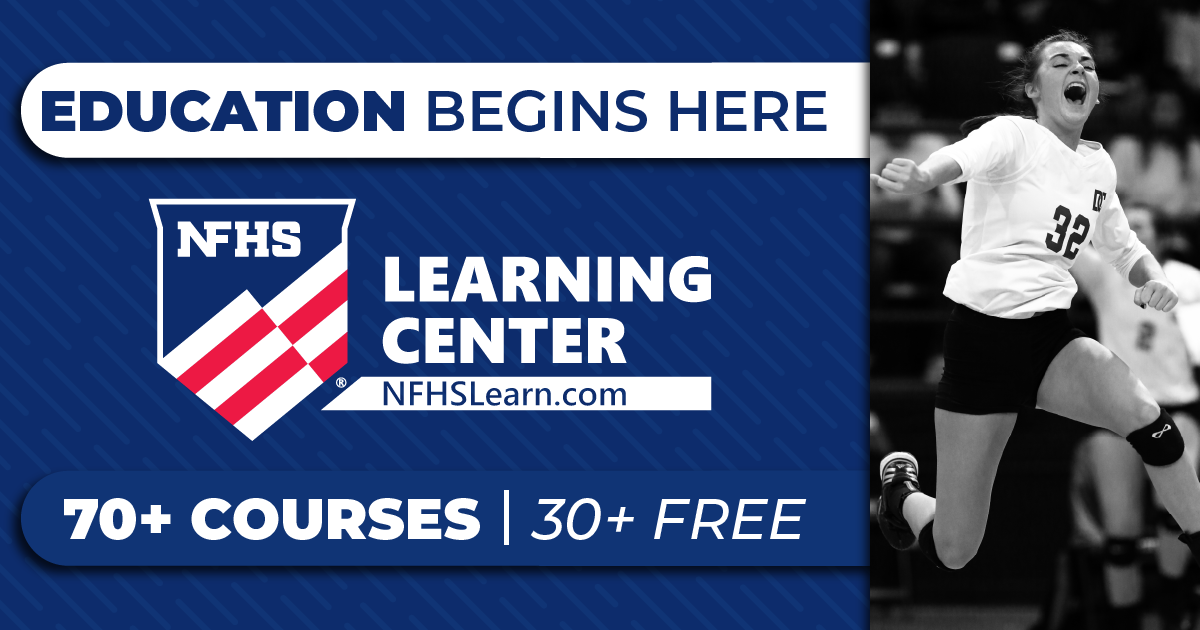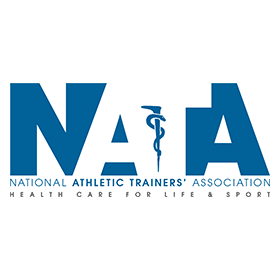Sports Medicine
AEDs for ATHLETES
Preparedness, Education, Action
Training for High School Students
Thanks to a grant from the NFHS Foundation, AEDs for Athletes created this life saving training video. This was produced by high school students, for high school students, teaching CPR and AED use. This is a powerful peer-to-peer educational tool that can make a real difference in saving lives. Please share this resource with your high schools, teams, health classes, and coaches, as we want to empower students with confidence to act in an emergency. We hope to increase survival rates for sudden cardiac arrest in schools and beyond.
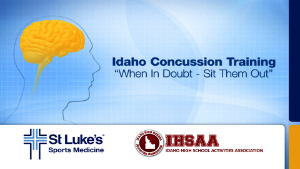
ST. LUKES
CONCUSSION COURSE
REQUIRED IDAHO COURSE
The IHSAA in partnership with St. Luke's Sports Medicine and the IHSAA Sports Medicine Advisory Committee have created a Idaho specific course required for all Idaho coaches, officials and event administrators.

BULLYING, HAZING AND INAPPROPRIATE BEHAVIORS
Bullying, Hazing and Inappropriate Behaviors defines and provides recommendations for coaches in three specific areas: inappropriate relationships and behaviors, hazing, and bullying (including cyberbullying). This course educates coaches about their legal responsibility to provide a safe and respectful environment for the students in their care.

PROTECTING STUDENTS FROM ABUSE
Abusive behaviors and misconduct do not belong within athletic and activity programs. To assist in creating an enjoyable and safe environment for students, the U.S. Center for SafeSport, in collaboration with the NFHS, has developed “Protecting Students from Abuse.” The course presents definitions of several types of abusive behaviors and misconduct, the signs and symptoms of abuse, and the ways in which someone can report these behaviors. The course also includes some DOs and DON’Ts for making a report.

SPORTS NUTRITION
Proper nutrition is key to optimizing health and athletic performance. This course presents guidelines for the diet needed to be ready for athletic practice and competition, and how to refuel afterwards. It gives tips on how you can influence your students’ eating habits outside of the school environment. Specific examples are provided for what types of foods students should and should not eat to replenish their bodies between activities.
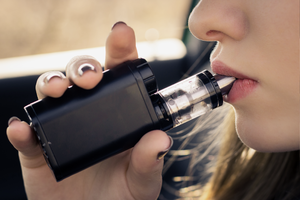
UNDERSTANDING VAPING AND E-CIGARETTES
Vaping is the act of inhaling an aerosol created by an e-cigarette or similar device. The term "vaping" misleads the user into thinking they are inhaling a vapor and something potentially safe or at least harmless. This is just one reason why the NFHS, with support from the Office of the U.S. Surgeon General, has created Understanding Vaping and E-cigarettes. This course helps dispel such misconceptions and highlights specific risks such as nicotine addiction for youth who try vaping and e-cigarettes.
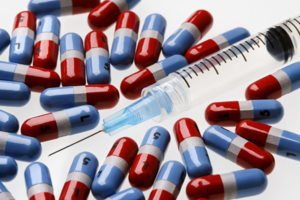
APPEARANCE AND PERFORMANCE ENHANCING DRUGS AND SUBSTANCES
The use of Appearance and Performance Enhancing Drugs and Substances, or APEDS, affects every school. To help the interscholastic community address this issue, the NFHS has created this APEDS course. The course explains what APEDS are, what forms they take, and what their effects can be on students. It highlights the reasons why students use APEDS in and out of athletics and gives guidance and resources for detecting and preventing the use of APEDS. No matter what your relationship is to high school activities, this information will be beneficial to you.
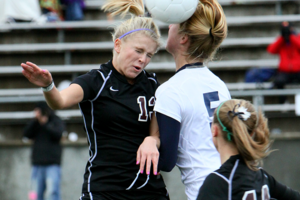
CONCUSSION FOR STUDENTS
Concussion for Students, developed in Partnership with the Barrow Neurological Institute, has been designed specifically for students to inform them on how to identify, react to, and prevent concussions. This free course is presented as a social media conversation, showing how four different students learn about concussion in different ways. It includes high school students and medical professionals discussing concussion. The key goal is for students to be able to identify signs and symptoms of a concussion so that they can get immediate help before any further injury can occur.
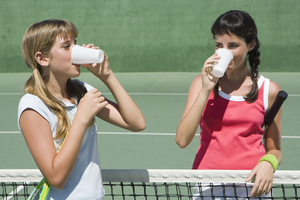
HEAT ILLNESS PREVENTION
Exertional Heat Stroke is the leading cause of preventable death in high school athletics. To help you minimize the risk of heat illness at your school, this course has designed to provide the fundamentals of a strong heat acclimatization plan and guidelines for limiting activities to account for changing environmental conditions and other contributing risk factors. It highlights the importance of an appropriate hydration plan and establishing an Emergency Action Plan in case of a suspected exertional heat stroke.
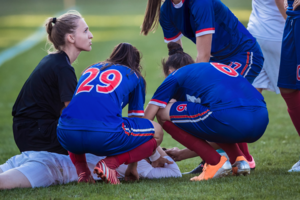
THE COLLAPSED ATHLETE
Every year high school students endure serious injuries and suffer life-threatening medical emergencies while participation in sports and activities. The causes are many and varied. Some may result from known medical condition, while others may be a consequence of the activity, environmental conditions, or an unrecognized medical condition. The bottom line, when you witness the collapse of an athlete, you may be responsible for their immediate and appropriate care. But what do you do? Who do you call? Where do you start? This course will teach you the importance of developing and Emergency Action Plans and practicing them, including assigning responsibilities to team members. When your athlete collapses and you will be prepared when any emergency arises.
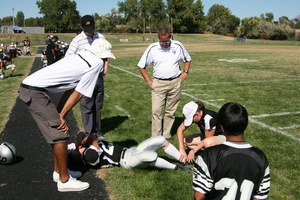
FIRST AID, HEALTH AND SAFETY
There may be no more critical element in the ability of interscholastic students to participate in activities than their health and safety. The NFHS has partnered with the American Red Cross to bring you this course. This course is designed as an overview of first aid, including best practices for many situations requiring medical attention. The skills taught in this course do not replace the expertise of a medical professional but they do offer guidelines and techniques for temporary assistance until medical experts arrive on the scene. And because accidents or injuries can happen anywhere, not all of the knowledge and skills you will learn in this course are strictly for athletic injuries.
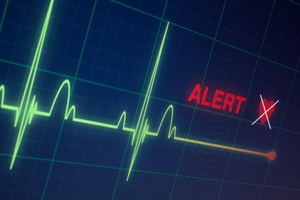
SUDDEN CARDIAC ARREST
Sudden Cardiac Arrest is the number one cause of death in the United States for student athletes during exercise. Caused by a structural or electrical problem associated with the heart, Sudden Cardiac Arrest happens when the heart unexpectedly stops beating and pumping blood. With content developed by Simon's Heart, this course will help you learn and recognize the warning signs and symptoms of Sudden Cardiac Arrest. Also included are tips for what to do in the critical moments after an individual suddenly collapses in order to save their life.

STUDENT MENTAL HEALTH AND SUICIDE PREVENTION
It's widely known that stress, anxiety and depression create challenges for both society and individuals, including interscholastic students. And severe conditions can lead to the worst outcomes, such as suicide.The NFHS is proud to bring you this course on Student Mental Health and Suicide Prevention in response to this reality. With a focus on wellness, including both physical and psychological, this course highlights causes, strategies and provides helpful resources.For students, their peers and anyone responsible for their care and well-being, take the course Student Mental Health and Suicide Prevention.
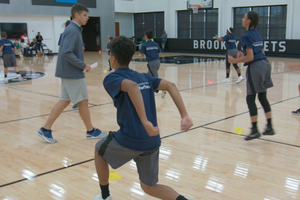
ACL INJURY PREVENTION
Every season, ACL injuries take thousands of students out of the game. To help you reduce the risk of ACL injuries for your student-athletes, the NFHS has partnered with the Hospital for Special Surgery to bring you this course. This course is designed to teach you about the causes of ACL injury, how to identify and correct movement deficiencies that can lead to ACL injuries, and how to effectively lead a Neurodynamic Warm-Up before practices and games.
Related Links
ADVISORY COMMITTEE
